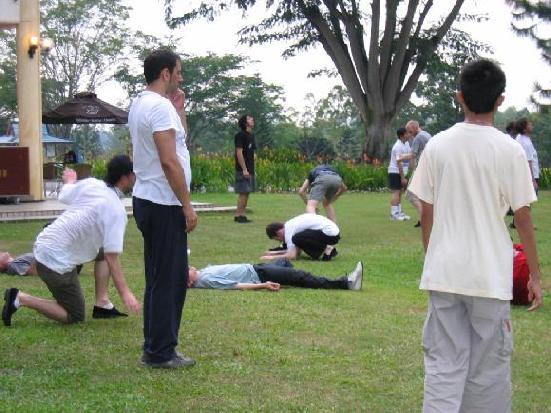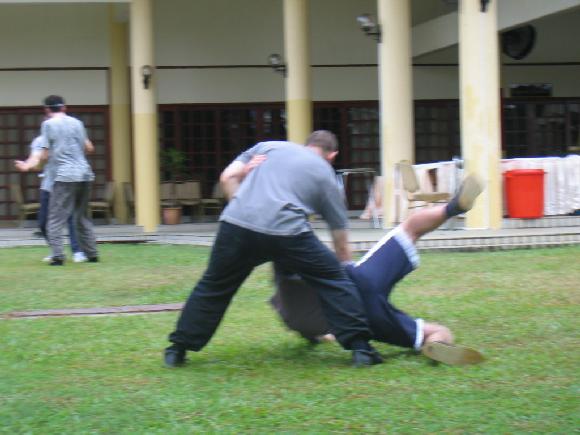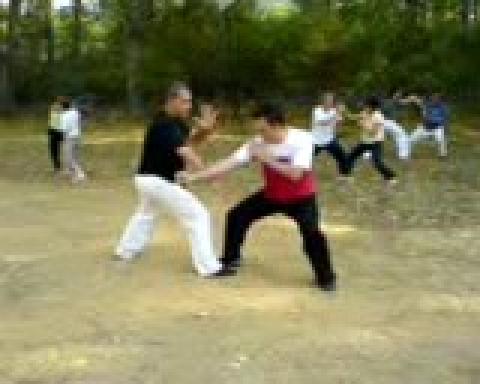June 2006 (Part 3)
SELECTION OF QUESTIONS AND ANSWERS

Participants of an Intensive Shaolin Kungfu Course enjoying a chi flow with some interesting spontaneous movements after a kungfu session
Question 1
For the past year or so I have been trying to read and study chi kung to understand it so as to remove my fear. In most books the authors say to move qi with yi or mind. I even took a remedial chi kung class from a reputable teacher and he asked me to visualize, moving the toxic qi with the mind.
— Bradley, USA
Answer
It is true that one moves “qi” (energy) with “yi” (intention). This is actually a natural ability, like moving our bones with muscles, or digesting food with gastric acids, and we do it all the time unconsciously. When you lift your hand to take a book, for example, you are using your mind to move energy to your hand to enable the muscles to move your hand to take a book.
But deliberately using mind to move energy, like directing it to massage internal organs or using it to perform kungfu movements in combat, is an advanced skill, and should be learnt from and practiced under a master. Doing it wrongly, which is likely the case if practiced on your own, may cause serious harmful effects.
Different teachers and schools have different methods and philosophy in their teaching. The method described by the teacher you mention is not what we normally use in Shaolin Wahnam. It is obvious from your questions that you have no experience of generating energy flow and managing its movement. Asking you to move toxic qi with your mind, when you do not have basic skills in energy flow and management, is likely to cause you confusion and harmful effects. We can achieve the same result that master intended by asking you to breathe out gently with your mouth open.
In fact we can achieve much better result. Even when you can successfully move toxic qi with your mind, you do so with conscious effort, and the toxic qi may move inside your body without being disposed out. When you breathe out gently with your mouth open, you clear toxic qi out of your body without conscious effort. And if you develop this habit of breathing out gently through your mouth, you can clear toxic qi all the time, and not only when you use your mind to move it.
Question 2
According to another master, this master would be teaching us to be schizophrenics! The first master also states that focusing on the dan tian should only be practiced after heat is felt there. Then it should be discontinue. He says that if one keeps thinking of the dan tian and trying to move energy from there to other parts of the body, he may “disintegrate into evil". Or have I misunderstood something?
Answer
Yes, you have misunderstood something. What the master suggested was that “disintegration into evil” or in modern terms “deviations with harmful results” would occur if one focused on the dan tian wrongly or moved energy from the dan tian to other parts of the body wrongly. A person learning from books, or learning low level chi kung even from a master, is likely to practice wrongly when he attempts high level skills.
But if you learn the skills from a master or a competent instructor, and practice the skills correctly, focusing on the dan tian and moving energy from it is not harmful. Often it is beneficial.
Actually focusing on the dan tian is practiced by most chi kung practitioners, even beginners. Practitioners usually complete their chi kung practice by gently thinking of their dan tian, even when they may not have felt heat there.
Thinking of the dan tian is focusing on the dan tian. It must be done gently, and the thinking or focusing is done only once or twice, not continuously all the time. If this is performed correctly, after some time the practitioners may (or may not) feel heat at their dan tian, indicating that some energy has been accumulated there.
Nevertheless, there are chi kung exercises where practitioners focus on their dan tian continuously. These are advanced exercises, and should be practiced under the supervision of a master. Practicing wrongly can cause serious harmful effects.
On the other hand, moving energy from the dan tian to other parts of their bodies is often practiced by those kungfu practitioners with internal force. When they strike with their palm, for example, they channel their energy from their dan tian to their palm to be exploded out forcefully to strike their opponent.
Some of them do so unconsciously, without realizing the mechanics of energy flow. Others do so with their mind directing their chi. Their strikes then are usually more powerful. When they are more advanced, they need not use their mind consciously. Spontaneously their chi will flow from their dan tian to their palm for the strike, unless they purposely withhold the internal force so as not to hurt their opponent or control it in certain ways to hurt their opponent in particular ways.
Using mind to direct energy, and using energy to perform kungfu movements is a very high level skill, especially in Taijiquan. Some of my disciples can do this. It may be unbelievable but true that a few of the students who attended my Intensive Taijiquan Course achieved this skill at the course itself. Video clips showing their performance of using mind to move energy to move forms can be accessed here. These disciples and students of mine are among the healthiest and happiest of people.
Surprisingly it may be, some internal art instructors, especially those accomstomed to external training like punching sandbags and weight lifting, may not believe in chi and internal force. That is their business. But it is regretable that they debase internal arts to become brutal ones, and many people genuinely interested in chi and internal force may be misled to think these internal aspects as myths, thus denying themselves their wonderful benefits.
Question 3
This presents a great problem within me. I have an unhealthy family and want to do my part to help bring health to them, and they would be willing. Many internal exercises seem to be of great benefit, yet I don't know who to trust or what is safe. I trust you sir because you are kind to answer questions, and because of your reputation and testimonials. I would be very grateful for some answers and would pay money just to be able to talk to someone like you sir.
Answer
Different masters and different schools hold different philosophies as well as practice different levels of chi kung.
There is no doubt that practicing chi kung brings good health, vitality and longevity. High level chi kung, understandably, brings better result and in a shorter time than low level chi kung.
However, much of chi kung practiced today has been so debased that they are no longer chi kung, which is an internal art, although it is still known by this name. It has become a sort of gentle physical exercise without internal aspects.
Often the instructors teaching these gentle physical exercises do not realize it, and honestly think they are teaching chi kung. A crucial difference is that genuine chi kung works on energy, whereas gentle physical exercise works only on the physical body, such as joints and muscles. If the art does not work on energy, even though the forms or patterns are genuine chi kung forms, then it is not chi kung.
A good approach to benefit from chi kung practice is firstly to have some knowledge of what chi kung is. Next, define your aims and objectives in wanting to practice chi kung. Then find the best available teacher who can help you to realize your aims and objectives at a price you can afford, and learn from him. Then comes the part that takes up the most time and effort, but it is probably also the most rewarding. Practice consistently and regularly what the teacher has taught you — not the way you think chi kung should be practiced. Periodically review your progress or otherwise with reference to your set aims and objectives.
You need not pay me money for my advice, irrespectively of whether you will learn from me. I am glad I can be of some help.

Mohammad of England applying the Shaolin pattern “Uprooting Tree with Roots” to throw Franciskus of Indonesia at an Intensive Shaolin Kungfu Course in Malaysia
Question 4
Why do people sell books and videos on chi kung and not say that one shouldn't practice without a competent teacher?
Answer
There are a few reasons why this happens. Some authors may have the theoretical knowledge but not the practical experience of what they are writing. They may not know that the exercises they describe are harmful if practiced wrongly. Or they may not believe that a master's personal teaching is necessary.
Some authors may have practical experience of the exercises they describe, but they practice them at a low level. It is worthy to note that whether a chi kung exercise is of high or low level often depends not on the form of the exercise but on how it is being practiced. In other words the same exercise may be practiced at a low level or at a high level.
When an exercise is performed wrongly at a low level, the harm is negligible. This actually happens quite often. But when the same exercise is performed wrongly at a high level, the harm can be serious. An author used to performing an exercise at a low level may not see the need to warn his readers to practice it with the supervision of a master.
Some authors, and most readers, do not realize the difference between skills and techniques. They mistakenly think that once a student knows the correct technique he can perform the exercise correctly. This is not true and many people do not realize this. For example, from reading you may know the technique of focusing at the dan tian, but you may not have the skill to do so. Such authors therefore would not mention that a competent teacher is necessary.
Sometimes the authors themselves may not have performed the exercises correctly. A good example here is the Horse-Riding Stance. An author may know the correct techniques of performing the stance, and he may also know that it is necessary to be upright and relaxed in the practice. Yet, he himself may be tensed and bending his body forward in his own practice, without realizing it. It is also unlikely that he will mention in his book the necessity of learning from a competent teacher.
Question 5
My great grandfather lived to be 98 and walked straight and talked and lived on his own peacefully until that age, yet he didn't formally practice any chi kung or internal exercises. I think he may have done things that naturally helped keep him healthy and enjoying life. He was a good Christian but he wasn't a saint. For someone like him, was it his genes that kept him so healthy and happy? I feel ashamed to have done so much harm to myself through wrong chi kung and drugs, for I am a carrier of his wonderful genes and I want to make my ancestors proud.
Answer
Yes, I believe your great grandfather had very good genes, and he lived a good life. In chi kung terms he had good pre-natal chi.
As you have realized your previous wrong doings and are ready to lead a good normal life, you should feel proud instead of ashamed. Leading a good, healthy life will enable the wonderful genes you have inherited from your great grandfather to manifest their practical benefits for you, including health and longevity. This will make your ancestors proud.
Bradley's other questions can be found in the Selection of Questions and Answer June 2006 Part 2.
Question 6
I'm 28 years old! So I was thinking that Choy Lee Fut is better because I like to use fast movements! I choose Choy Lee Fut instead of Yang Tai Chi but I do not really know if this is the best choose if I'm going to train in your Kung Fu Intensive Course some day in the future. But I'm a little confused too about Choy Lee Fut, wondering if I'm too old to train a hard style Kung Fu. So would it be better if I train Tai Chi and then train in your Tai Chi Course? Sifu, can you give me some advice which style should I use before training your Kung Fu course or Chi Kung Course?
— Hugo, Sweden
Answer
Both Choy-Li-Fatt and Yang Style Taijiquan are wonderful martial arts. If you intend to attend my Intensive Shaolin Kungfu Course in future, if all other things were equal, Choy-Li-Fatt would be a better choice as preparation for the intensive course. If you intend to attend my Intensive Taijiquan Course, then Yang Style Taijiquan is a better choice.
On the other hand, there is no need for any prior martial art or chi kung experience to attend my Intensive Chi Kung Course. Also while it is certainly be beneficial, it is not necessary to attend my Intensive Chi Kung Course if you attend my Intensive Shaolin Kungfu Course or my Intensive Taijiquan Course because practicing Shaolin Kungfu or Wahnam Taijiquan in our school is practicing chi kung. In other words, there is no need to do other chi kung exercises if you practice Shaolin Kungfu or Wahnam Taijiquan as tuaght in Shaolin Wahnam.
Being 28 is not old at all for starting martial art if he learns from a good teacher. Many of my students started learning from me when they were already in their middle age, and they become younger and younger in both their looks and performance. Judging from what you have writtern, I believe attending my Intensive Shaolin Kungfu Course will be the best for you.

Participants at a regional Taijiquan course in Soria, Spain in 2005 practicing combat application
Question 7
I am healthy because I have been training Lifting the Sky Chi Kung since 6 months ago and I get stronger and stronger inside.
Answer
“Lifting the Sky” is a wondrous exercise. In fact if one just wants to remain healthy, he does not have to attend any of my courses. He can realize this goal by daily practicing “Lifting the Sky” as explained in my books. But a lot of healthy people learn chi kung from me because they want vitality and longevity as well as mental freshness and spiritual joy.
Question 8
For the spiritual part, I don't need anything because I have my own religion and I feel that I have all that I need in this religion which is Christianity, and I believe in all the good things in all other beliefs.
Answer
Congratulations for finding your religion. Although many people may not realize it, finding his religion is a very important aspect of a person's life. More significantly, you believe in the good things of other religions.
My teaching (whether in chi kung, Shaolin Kungfu or Wahnam Taijiquan) is non-religious but it is highly spiritual. My teaching enables you to cultivate and enrich your spirit irrespective of the religion you profess. In you case, you will become a better Christian. Many of the values you learn in your religion, like being kind to others and being with God, will come alive as you practice what you learn in my courses.
LINKS
Selected Reading
- Stance Training and Becoming a Scholar Warrior
- Following the Opponent´s Momentum
- Free Sparring at the England Summer Camp of 2005
- Experiencing Satori at Intensive Shaolin Kungfu Course — Joshua Lawson
- What is Wahnam Taijiquan
- Personal Experiences of Internal Force — Sifu Anthony Korahais
- Counters against Various Throws
